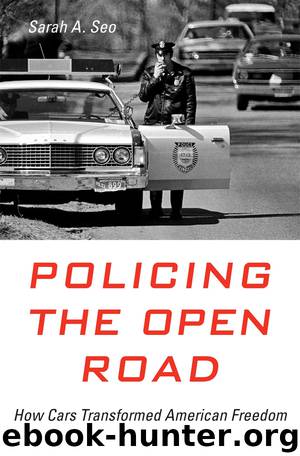Policing the Open Road by Sarah A. Seo

Author:Sarah A. Seo
Language: eng
Format: epub
Publisher: Harvard University Press
Since Wolf v. Colorado left the remedial question for the states, the debate over the exclusionary rule continued unabated.77 So did violations of the Fourth Amendment, making the case for exclusion increasingly compelling. But a sizable contingent still maintained that, as the New York police commissioner declared, excluding evidence would disrupt “the delicate balance between crime prevention and civil liberty.” Unsurprisingly, home invasions proved more persuasively than car searches that the “delicate balance” should shift toward individual rights. That was the case for the California Supreme Court, the first to follow the US Supreme Court’s lead in 1955.78
In People v. Cahan, officers sneaked into the home of a suspected bookmaker and placed a microphone under a chest of drawers, all without a warrant. Concern for Everyman suffused Chief Justice Traynor’s opinion. It “bears emphasis,” he stressed, “that the court is not concerned solely with the rights of the defendant before it, however guilty he may appear, but with the constitutional right of all of the people.” Traynor made this point repeatedly, emphasizing that the “innocent suffer with the guilty” and that the exclusionary rule was thus “primarily for the protection of the innocent.” By using the guilty as the guardian for Everyman, Traynor acknowledged that criminals like Cahan would go free. But that was “preferable … than that the right of privacy of all the people be set at naught.” Only this tradeoff, Traynor maintained, could prevent a “government of laws” from turning into “the police state.”79
As expected, Cahan prompted outcry from law enforcement quarters. Los Angeles’s police chief and city attorney denounced the court for impeding police work and warned that the exclusionary rule would lead to more crime. By 1958, the police department was claiming that its predictions had come true; its annual review insinuated that the “fact that crime increased in both Los Angeles and the state of California, immediately subsequent to the Cahan decision in 1955, appears to be more than a mere matter of statistical coincidence.” But Cahan had its supporters as well. Superior Court Judge Stanley Mosk and the district attorney both refuted the charge that crime had gone up since the decision came down.80
The two sides clashed over an episode of Dragnet that became the subject of an ACLU memorandum. In the show, Sergeant Joe Friday and his assistant Ben were looking for a narcotics dealer who reportedly had six to eight ounces of heroin and intended to sell it to young children. They happened upon Sam, a known dope user, who was about to enter a car. They ran over and immediately searched him and found the heroin. They also searched the car and found two dozen cashmere sweaters that had been stolen. “Just why the cashmere sweaters came into the picture is puzzling,” the ACLU memo noted. But those sweaters had a point to make. When Friday returned the goods, the shopkeeper, who had previously disliked the police, heaped praise on the sergeant’s ability to solve the crime before he had even noticed that his merchandise had been stolen.
Download
This site does not store any files on its server. We only index and link to content provided by other sites. Please contact the content providers to delete copyright contents if any and email us, we'll remove relevant links or contents immediately.
| General | Discrimination & Racism |
Nudge - Improving Decisions about Health, Wealth, and Happiness by Thaler Sunstein(7689)
The Fire Next Time by James Baldwin(5429)
iGen by Jean M. Twenge(5408)
Adulting by Kelly Williams Brown(4564)
The Sports Rules Book by Human Kinetics(4377)
The Hacking of the American Mind by Robert H. Lustig(4372)
The Ethical Slut by Janet W. Hardy(4241)
Captivate by Vanessa Van Edwards(3837)
Mummy Knew by Lisa James(3686)
In a Sunburned Country by Bill Bryson(3535)
The Worm at the Core by Sheldon Solomon(3483)
Ants Among Elephants by Sujatha Gidla(3459)
The 48 laws of power by Robert Greene & Joost Elffers(3231)
Suicide: A Study in Sociology by Emile Durkheim(3017)
The Slow Fix: Solve Problems, Work Smarter, and Live Better In a World Addicted to Speed by Carl Honore(3001)
The Tipping Point by Malcolm Gladwell(2909)
Humans of New York by Brandon Stanton(2864)
Handbook of Forensic Sociology and Psychology by Stephen J. Morewitz & Mark L. Goldstein(2692)
The Happy Hooker by Xaviera Hollander(2686)
